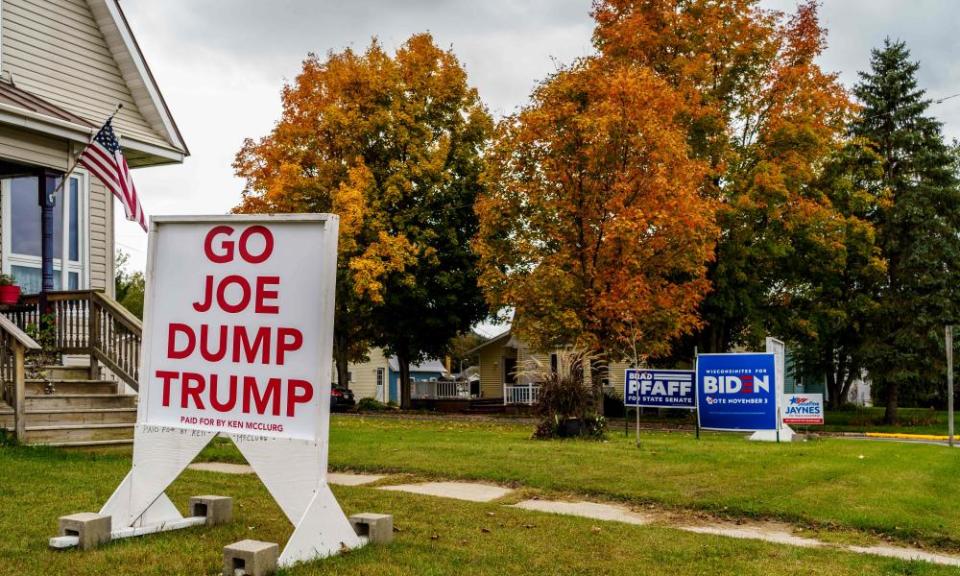Democrats urge voters to hand-deliver ballots to beat court deadline

Democratic campaigners were scrambling to convince American voters to deliver absentee ballots by hand rather than rely on the US postal service, after the supreme court sided with Republicans in Wisconsin in refusing to allow a count of votes arriving after election day.
Democrats argued that the flood of absentee ballots, and other challenges posed by the coronavirus pandemic, made it necessary to extend the posting deadline. The court is due to hear similar cases from two pivotal battleground states, North Carolina and Pennsylvania, before 3 November.
With the bench now packed with a 6-3 conservative majority after the swearing in on Tuesday of the new Donald Trump-picked justice, Amy Coney Barrett, the supreme court has become the object of intense scrutiny.
Barrett, 48, was formally sworn in by the US chief justice, John Roberts, in a private ceremony on Tuesday, fuelling anxiety among Democrats over what her presence in the court might mean for other election-related cases, including any challenge to the result.
The Wisconsin decision triggered a rush by Democratic party campaign workers to track more than 360,000 so far unreturned mail-in ballots in the state. They urged voters to deliver their ballots by hand by 3 November rather than rely on a postal service that has been hamstrung by delays, some reportedly politically inspired.
“We’re phone banking. We’re text banking. We’re friend banking. We’re drawing chalk murals, driving sound trucks through neighbourhoods & flying banners over Milwaukee. We’re running ads in every conceivable medium,” Ben Wikler, the party’s chairman in Wisconsin, tweeted after the supreme court decision.
With Barrett formally joining the court on Tuesday concern has grown over how she might rule in any election related case, not least in the event of a contested election.
In a century and a half no justice has been sworn in so close to an election; and Trump has said he expects the court to decide the outcome of the US election campaign – in which the Democrat Joe Biden currently enjoys a national nine-point lead.
The supreme court has only once decided the outcome of a US presidential election; that was the disputed contest in 2000 which ultimately was awarded to the Republican George W Bush over his Democrat rival, Al Gore.
The supreme court is also weighing a plea from Trump to prevent the Manhattan district attorney from acquiring his tax returns. Focus on the US president’s partisan effort to stack the court comes with justices also due to hear a series of high-profile cases including over Obamacare and LGBTQ rights.
While it is not certain Barrett will take part in any of these issues, it is up to her to make the decision whether or not to recuse herself. Barrett, the most open opponent of abortion rights to join the court in decades, could also be called upon to weigh in on Mississippi’s 15-week abortion ban.
Related: Judges' politics absolutely sway how they decide cases. I crunched the numbers | Zalman Rothschild
Trump has said he wants Barrett to be confirmed before election day so she could cast a decisive vote in any election-related dispute, potentially in his favour.
The Wisconsin ruling on vote counts comes as the two candidates for president entered the final week of campaigning. Amid a historic wave of early voting, more than 70 million Americans having already cast their ballots, the Biden campaign released two new “closing argument” ads emphasising that the election represented both a test of “character” and a “battle for the soul of the nation” (without mentioning Trump by name).
Significantly about half of those who have already voted early have done so in a dozen or so of the battleground states that will likely decide the presidency.
With Trump staging rallies in Michigan, Wisconsin and Nebraska on Tuesday, Biden was scheduled to hold two events in Georgia, a state not won by Democrats in a presidential election since 1996.
In the midst of the continuing campaigning, and with national polls showing Biden maintaining a substantial lead, the moves around the supreme court have assumed an outsized significance even as Barrett vowed it was the “job of a judge to resist her policy preferences”.
The last week of the campaign will take place against the backdrop of a record seven-day stretch of new coronavirus cases reaching above 71,000 daily.
Focus on the court has intensified with the Wisconsin ruling, which was seen as an indication of how Barrett’s appointment could affect such cases. The conservative majority, even before her appointment, generally sided with state officials opposing court-imposed changes to election procedures to make it easier to vote during the pandemic. The ruling on Monday prevents Wisconsin from counting mailed ballots that are received after election day.
In his ruling Justice Brett Kavanaugh, another Trump pick, appeared to give support to the president’s argument that results counted after election day could be fraudulent. He said results should be announced on election night to avoid “the chaos and suspicions of impropriety that can ensue if thousands of absentee ballots flow in after election day and potentially flip the results of an election”.

